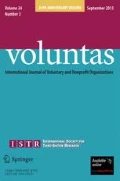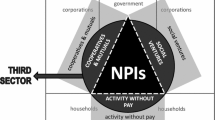Abstract
This paper examines the nonprofit sector from the perspective of the Austrian school of economic thought. In contrast to the traditional market failure approach, the Austrian school locates the role of the nonprofit sector in the facilitation of the spontaneous order and the utilization of local dispersed knowledge about the societal needs through a Hayekian “discovery procedure.” Another contribution of the Austrian school is in calling attention to the “calculation challenge” faced by the nonprofit sector, i.e., the reduced role of monetary signals as the informational basis for decision making. The calculation challenge brings up the important issue of societal feedback mechanisms operating in the nonprofit sector. It is shown that, in the nonprofit sector context, this challenge takes the form of the accountability problem.
Résumé
“The nonprofit catallaxy: An Austrian economics perspective on the nonprofit sector” Cet article examine le secteur à but non lucratif en adoptant la perspective de l’école autrichienne de pensée économique. En contraste avec l’approche traditionnelle dite de « défaillance du marché » , l’école autrichienne considère que le rôle du secteur à but non lucratif est de faciliter l’ordre spontané et de mettre en oeuvre, par le biais de la « procédure de découverte » identifiée par Friedrich Hayek, une reconnaissance des besoins sociaux qui reste diffuse au niveau local. Une autre contribution de l’école autrichienne est d’avoir attiré l’attention sur “le défi de calcul” auquel le secteur à but non lucratif est confronté, c’est-à-dire, sur la moindre importance des indicateurs financiers comme facteurs de décision dans ce secteur. Le défi du calcul amène à considérer le problème important des mécanismes d’évaluation sociale en oeuvre dans le secteur à but non lucratif. Il est démontré que, dans le contexte du secteur à but non lucratif, ce défi prend la forme d’un problème de responsabilité financière.
Zusammenfassung
“The nonprofit catallaxy: An Austrian economics perspective on the nonprofit sector” Der vorliegende Beitrag untersucht den Nonprofit-Sektor aus Sicht der Österreichischen Schule. Im Gegensatz zum traditionellen Denkansatz des Marktversagens sieht die Österreichische Schule die Rolle des Nonprofit-Sektors darin, die Entwicklung der spontanen Ordnung und die Nutzung lokal verstreuten Wissens über die gesellschaftlichen Bedürfnisse auf dem Wege eines Hayekschen “Entdeckungsverfahrens” zu erleichtern. Darüber hinaus weist die österreichische Schule auf das “Kalkulationsproblem” hin, dem der Nonprofit-Sektor ausgesetzt ist, d. h. auf die geringere Bedeutung monetärer Signale als Informationsgrundlage für die Entscheidungsfindung. Das Kalkulationsproblem wirft die wichtige Frage nach den gesellschaftlichen Feedback-Mechanismen im Nonprofit-Sektor auf. Es wird gezeigt, dass dieses Problem im Nonprofit-Sektor die Form des Rechenschaftsproblems annimmt.
Resumen
El presente documento examina el sector sin ánimo de lucro desde la perspectiva de la escuela austríaca de pensamiento económico. En contraste con el enfoque tradicional del fallo del mercado, la escuela austríaca sitúa el papel del sector sin ánimo de lucro en la facilitación del orden espontáneo y la utilización del conocimiento local disperso sobre las necesidades societales mediante un “procedimiento de descubrimiento” hayekiano. Otra contribución de la escuela austríaca consiste en llamar la atención sobre el “desafío del cálculo” al que se enfrenta el sector sin ánimo de lucro, es decir, el papel reducido de las señales monetarias como base informativa para la toma de decisiones. El desafío del cálculo saca a colación la importante cuestión de los mecanismos de feedback societales que operan en el sector sin ánimo de lucro. Se muestra que, en el contexto del sector sin ánimo de lucro, este desafío toma la forma del problema de la responsabilidad.
摘要
本文用奥地利经济学派的观点对非营利部门进行了探讨。与传统的市场失效方法相反的是,奥地利学派认为,非营利部门的作用是通过哈耶克所说的“发现过程”,促使自发秩序的形成,对关于社会需求的局部分散知识加以利用。奥地利学派的另一项贡献是呼吁关注非营利部门面对的“计算难题”,即作为决策的信息基础,货币信号的作用减弱的问题。计算难题带来了一个重大问题:在非营利部门内部运作的社会反馈机制。可以看出,就非营利部门而言,这一难题具体表现为责任问题。
ملخص
يدرس هذا البحث القطاع الغير ربحي من وجهة نظر المدرسة النمساوية للفكر الاقتصادي.على النقيض من فشل نهج السوق التقليدي، تحدد المدرسة النمساوية دور القطاع الغير ربحي في تسهيل أمر عفوي والإستفادة من المعارف المحلية حول الإحتياجات المجتمعية من خلال “إجراء إكتشاف “ Hayek “. مساهمة أخرى للمدرسة النمساوية في لفت الإنتباه إلى أن “تحدي الحساب” التي يواجهها القطاع الغير ربحي، أي تقليص دور الإشارات النقدية كأساس معلوماتي لإتخاذ القرار. تحدي الحساب يبدأ الحديث عن مسألة هامة من آليات ردود الفعل المجتمعية العاملة في القطاع الغير ربحي. يظهر أنه، في إطار القطاع الغير ربحي، هذا التحدي يأخذ شكل مشكلة المساءلة.
Similar content being viewed by others
References
Anheier, H. K., & Salamon, L. M. (2006). The nonprofit sector in comparative perspective. In W. W. Powell & R. Steinberg (Eds.), The nonprofit sector: A research handbook. New Haven, CT: Yale University Press.
Boettke, P. (Ed.). (2010). Handbook on contemporary Austrian economics. Cheltenham: Edward Elgar.
Boettke, P., & Coyne, C. (2008). The political economy of philanthropic enterprise. In G. E. Shockley, P. M. Frank & R. R. Stoughs (Eds.), Non-market entrepreneurship: Interdisciplinary approaches. Cheltenham: Edward Elgar.
Boettke, P. J., & Prychitko, D. L. (2004). Is an independent nonprofit sector prone to failure? Toward an austrian school interpretation of nonprofit and voluntary action. Conversations in Philanthropy, 1(1), 1–40 (http://www.conversationsonphilanthropy.org/PDFs/2004_Boettke_Prychitko.pdf). Accessed 1 July 2012.
Borzaga, C., & Tortia, E. (2010). The economics of social enterprises: An interpretative framework. In L. Bechetti & C. Borzaga (Eds.), The economics of social responsibility: The world of social enterprises. London: Routledge.
Butler, E. (2010). Austrian economics: A primer. London: Adam Smith Institute.
Chalupnicek, P. (2005). Altruism and public goods: A reassessment. Paper presented at the Southern Economic Association Annual Meeting, November 18–20, Washington, DC.
Clemens, E. (2006). The constitution of citizens: Political theories of nonprofit organization. In W. W. Powell & R. Steinberg (Eds.), The nonprofit sector: A research handbook. New Haven, CT: Yale University Press.
Evers, A., & Laville, J. (2004). The third sector in Europe. Cheltenham: Edward Elgar.
Fitzpatrick, S., & Pawson, H. (2007). Welfare safety net or tenure of choice? The dilemma facing social housing policy in England. Housing Studies, 22(2), 163–182. Accessed 1 July 2012.
Froehlich, K. (1999). Diversification of revenue strategies: Evolving resource dependence in nonprofit organizations. Nonprofit and Voluntary Sector Quarterly, 28, 246–268.
Frumkin, P. (2002). On being nonprofit: A conceptual and policy primer. Cambridge: Harvard University Press.
Fulbright-Anderson, S., & Auspos, P. (Eds.). (2006). Community change: Theories, practice, and Evidence. Washington DC: The Aspen Institute.
Galera, G., & Borzaga, C. (2009). Social enterprise: An international overview of its conceptual evolution and legal implementation. Social Enterprise Journal, 5, 210–228.
Hansmann, H. (1987). Economic theories of nonprofit organization. In W. W. Powell (Ed.), The nonprofit sector: A research handbook. New Haven, CT: Yale University Press.
Hayek, F. A. (1945). The use of knowledge in society. American Economic Review, 35, 519–530.
Hayek, F. A. (1978). Law, legislation and liberty, Vol. 2: The mirage of social justice. Chicago: University of Chicago Press.
Hayek, F. A. (1981). Law, legislation and liberty, Vol. 3: The political order of a free people. Chicago: University of Chicago Press.
Hayek, F. A. (1994). The road to serfdom. Chicago: University of Chicago Press.
Hayek, F. A. (1998). Law, legislation and liberty, Vol. 1: Rules and order. London: Routledge.
Iliopoulos, C., & Valentinov, V. (2009). Toward an economics of the rural third sector. International Journal of Agricultural Resources, Governance and Ecology, 8(5–6), 439–456.
James, E. (1987). The nonprofit sector in comparative perspective. In W. W. Powell (Ed.), The nonprofit sector: A research handbook. New Haven: Yale University Press.
Kirzner, I. M. (1973). Competition and entrepreneurship. Chicago: The University Chicago Press.
Kirzner, I. M. (1997). Entrepreneurial discovery and the competitive market process: An Austrian approach. Journal of Economic Literature, 35(1), 60–85.
Kirzner, I. M., & Sautet, F. (2006). The nature and role of entrepreneurship in markets: Implications for policy. Mercatus Policy Series Policy Primer No. 4, Mercatus Center, George Mason University.
Lohmann, R. A. (2001). And lettuce is nonanimal: toward a positive economics of voluntary action. In J. S. Ott (Ed.), The nature of the nonprofit sector. Boulder: Westview.
Mises, L. (1998). Human action: A treatise on economics. Auburn: The Ludwig von Mises Institute.
Mises, L. (2003). Epistemological problems of economics. Auburn: The Ludwig von Mises Institute.
Murtaza, N. (2012). Putting the lasts first: The case for community-focused and peer-managed NGO accountability mechanisms. VOLUNTAS: International Journal of Voluntary and Nonprofit Organizations, 23(1), 109–125.
Pawson, H., Bright, J., Engberg, L., & van Bortel G. (2012). Resident involvement in social housing in the UK and Europe. http://www.hyde-housing.co.uk/client_files/Resident%20involvement%20in%20the%20UK%20and%20Europe_A5_120117.pdf. Accessed 1 July 2012.
Pies, I. (2012). Regelkonsens statt Wertekonsens: Ordonomische Schriften zum politischen Liberalismus. Berlin: Wissenschaftlicher Verlag.
Rothbard, M. N. (1981). The myth of neutral taxation. Cato Journal, 1(2), 519–564.
Salamon, L. M. (2001, reprint of 1999). Scope and structure: The anatomy of America’s nonprofit sector. In J. S. Ott (Ed.), The nature of the nonprofit sector. Boulder : Westview.
Sobel, R., & Leeson, P. (2007). The use of knowledge in natural disaster relief management. Independent Review, 11(4), 519–532.
Steinberg, R. (2006). Economic theories of nonprofit organizations. In W. W. Powell & R. Steinberg (Eds.), The nonprofit sector: A research handbook. New Haven: Yale University Press.
Valentinov, V. (2012). Understanding the rural third sector: Insights from Veblen and Bogdanov. Kybernetes: The international Journal of Cybernetics, Systems and Management, 41(1-2), 177–188.
Weisbrod, B. (1991). The nonprofit economy. Cambridge: Harvard University Press.
Acknowledgments
The authors are very grateful to anonymous reviewers for their helpful comments. The second author gratefully acknowledges the financial support from the Volkswagen Foundation.
Author information
Authors and Affiliations
Corresponding author
Rights and permissions
About this article
Cite this article
Wandel, J., Valentinov, V. The Nonprofit Catallaxy: An Austrian Economics Perspective on the Nonprofit Sector. Voluntas 25, 138–149 (2014). https://doi.org/10.1007/s11266-012-9330-9
Published:
Issue Date:
DOI: https://doi.org/10.1007/s11266-012-9330-9




